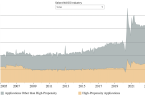Senate Bill 773: Cybersecurity Act of 2009 addresses the development of a ‘Secure Domain Name Addressing System’ which calls for several U.S. agencies to collaborate, implement and require U.S. businesses to use a ‘Secure Domain Addressing System’. This addressing system will be maintained by VirnetX using its patented proprietary ‘Secure Domain Name Registry’.
VirnetX is an internet holding corporation that is looking to develop ‘secure’ real time communication over their virtual private network (VPN). By creating it’s own ‘secure’ domain registry they can sell to their customers channels in which they can have seamless zero click or one click communication using multiple devices. VirnetX is ready to develop a secure peer-to-peer network using its ‘GABRIEL Connection Technology’. VirnetX CEO Kendall Larsen said about the current domain name system:
“The current Domain Name System, the basis by which we find and communicate with people or companies over the Internet, is broken and wide open to cyberattacks. The current methods for dealing with these attacks are temporary fixes at best. Until we secure the Internet at a foundational level, people and businesses will be vulnerable and preyed upon. Our patented technology derived from a U.S. NATIONAL SECURITY initiative, provides the necessary foundational measures to make the Internet a safe and trusted environment.”
After digesting all of this information and researching who is behind it all, this looks to me like the U.S. Gov’t and U.S Corporations are trying to force U.S. businesses use their domain registry in the name of ‘Cyber Security’. Senate Bill 773 which has not reached congress yet, was introduced by none other than Senator John Rockefeller and guess who co-sponsored this bill? Remember Olympia Snowe? A favorite amongst domainers. Section 9 of the bill calls for the U.S. Secretary of Commerce to have a strategy ready for implementation of the ‘Secure Domain Addressing System’ within three years of the bills enactment.
How the hell they plan on implementing and enforcing this kind of change, I have no clue. However they have the financial and political backing to try. ‘Security’ it’s all about ‘Security’ and by U.S. businesses using this ‘Secure Domain Addressing System’ will all of the sudden be sheltered and ‘Secure’ from cyber attacks? That is the claim VirnetX is making, and they have a political agenda in the works to make it mandatory for U.S. businesses to use their services.
News Wire Source: http://sev.prnewswire.com/computer-software/20090713/AQ4504713072009-1.html




[…] […]
We, VirnetX, are not affiliated with any government agency.
We just have the answer to securing the Internet and part of that equation includes the use of secure domain names.
Thanks for noticing!
Greg –
Thanks for your response. If this bill were to pass, could you elaborate on how secure domain names would differ from regular domain names? Besides just adding a few chips to internet infrastructure, what sort of implementation you expect to see? Is there a process for an existing domain to become a ‘secure’ domain?
Thanks!
[…] Mike wrote an interesting post today onNameTalent.com » Blog Archive » Cybersecurity Act Calls for <b>…</b>Here’s a quick excerpt […]
In my personal opinion, securing the domain addressing system alone wont stop the cyber attacks. There are many other factors as well to be taken into account.
So tell me, does this mean that people on the ‘ordinary’ internet would or would not be able to access sites that are on the Secure Domain Name Accessing System (SDNAS)?
What would be the punishment for businesses that didn’t switch over to the SDNAS?
Let’s say a big company (like Coca-Cola) is based in the US. It has a .com website, which serves as a portal for that company’s customers all over the world – i.e. it directs customers to their local version of the website and provides some general company info.
– Under these laws, would that company be forced to abandon their .com domain name in favour of a SDNAS even though many of the sites visitors are from outside the US?
– Could they get around the law by registering the domain name with one of it’s child companies in another country?
– What would happen for a company that was US based, but had a majority international customer base. Would they no longer be able to serve pages to a majority of their customer base?
– What constitutes a business? In theory, as soon as you start to make money, you are technically a business, right? Would that mean that hobby US domainers would suddenly be required to transfer to the SDNAS when they made a little money off adsense?
– Again, would they need to start using a special TLD, and in turn lose the domain that made them their money?
I think that this would actually be bad for the US. It would stifle the domain name industry and force many companies to move their web sites offshore, taking money out of the US economy – is that really something any country would want to be doing in todays economic climate?